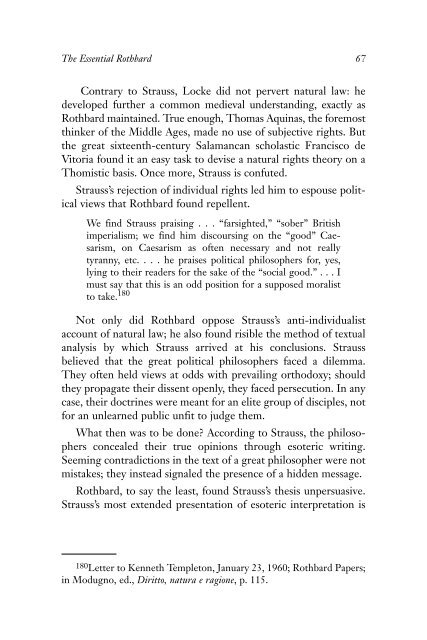The Essential Rothbard - Ludwig von Mises Institute
The Essential Rothbard - Ludwig von Mises Institute
The Essential Rothbard - Ludwig von Mises Institute
Create successful ePaper yourself
Turn your PDF publications into a flip-book with our unique Google optimized e-Paper software.
<strong>The</strong> <strong>Essential</strong> <strong>Rothbard</strong> 67<br />
Contrary to Strauss, Locke did not pervert natural law: he<br />
developed further a common medieval understanding, exactly as<br />
<strong>Rothbard</strong> maintained. True enough, Thomas Aquinas, the foremost<br />
thinker of the Middle Ages, made no use of subjective rights. But<br />
the great sixteenth-century Salamancan scholastic Francisco de<br />
Vitoria found it an easy task to devise a natural rights theory on a<br />
Thomistic basis. Once more, Strauss is confuted.<br />
Strauss’s rejection of individual rights led him to espouse political<br />
views that <strong>Rothbard</strong> found repellent.<br />
We find Strauss praising . . . “farsighted,” “sober” British<br />
imperialism; we find him discoursing on the “good” Caesarism,<br />
on Caesarism as often necessary and not really<br />
tyranny, etc. . . . he praises political philosophers for, yes,<br />
lying to their readers for the sake of the “social good.” . . . I<br />
must say that this is an odd position for a supposed moralist<br />
to take. 180<br />
Not only did <strong>Rothbard</strong> oppose Strauss’s anti-individualist<br />
account of natural law; he also found risible the method of textual<br />
analysis by which Strauss arrived at his conclusions. Strauss<br />
believed that the great political philosophers faced a dilemma.<br />
<strong>The</strong>y often held views at odds with prevailing orthodoxy; should<br />
they propagate their dissent openly, they faced persecution. In any<br />
case, their doctrines were meant for an elite group of disciples, not<br />
for an unlearned public unfit to judge them.<br />
What then was to be done? According to Strauss, the philosophers<br />
concealed their true opinions through esoteric writing.<br />
Seeming contradictions in the text of a great philosopher were not<br />
mistakes; they instead signaled the presence of a hidden message.<br />
<strong>Rothbard</strong>, to say the least, found Strauss’s thesis unpersuasive.<br />
Strauss’s most extended presentation of esoteric interpretation is<br />
180 Letter to Kenneth Templeton, January 23, 1960; <strong>Rothbard</strong> Papers;<br />
in Modugno, ed., Diritto, natura e ragione, p. 115.

















